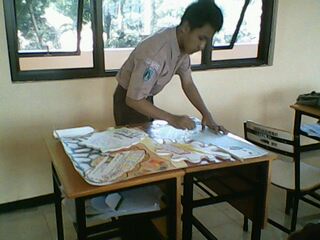Gifted students are the unique ones. The way they study is also different from the regular ones. The following are the characteristics of gifted students. I took from http://www.ri.net/gifted_talented/character.html and whether the characteristics are right, I try to check with the behaviour of gifted students in SMAN 1 Purwosari - Kabupaten Pasuruan.
Gifted children's behavior differs from that of their age-mates in the following ways:
- Many gifted children learn to read early, with better comprehension of the nuances of language. As much as half the gifted and talented population has learned to read before entering school.
- Gifted children often read widely, quickly, and intensely and have large vocabularies.
- Gifted children commonly learn basic skills better, more quickly, and with less practice.
- They are better able to construct and handle abstractions.
- They often pick up and interpret nonverbal cues and can draw inferences that other children need to have spelled out for them.
- They take less for granted, seeking the "hows" and "whys."
- They can work independently at an earlier age and can concentrate for longer periods.
- Their interests are both wildly eclectic and intensely focused.
- They often have seemingly boundless energy, which sometimes leads to a misdiagnosis of hyperactivity.
- They usually respond and relate well to parents, teachers, and other adults. They may prefer the company of older children and adults to that of their peers.
- They like to learn new things, are willing to examine the unusual, and are highly inquisitive.
- They tackle tasks and problems in a well-organized, goal-directed, and efficient manner.
- They exhibit an intrinsic motivation to learn, find out, or explore and are often very persistent. "I'd rather do it myself" is a common attitude.






